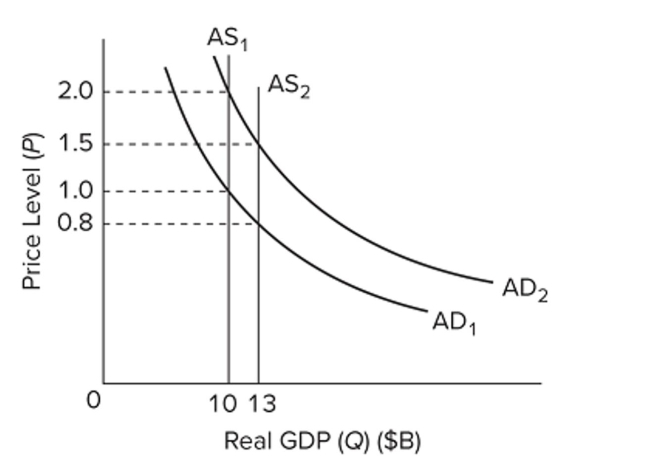Exam 19: Current Issues in Macro Theory and Policy
Exam 2: The Market System and the Circular Flow274 Questions
Exam 3: Demand, Supply, and Market Equilibrium357 Questions
Exam 4: Market Failures Caused by Externalities Asymmetric Information222 Questions
Exam 5: Public Goods, Public Choice, and Government Failure242 Questions
Exam 6: An Introduction to Macroeconomics243 Questions
Exam 7: Measuring Domestic Output and National Income238 Questions
Exam 8: Economic Growth274 Questions
Exam 9: Business Cycles, Unemployment, and Inflation298 Questions
Exam 10: Basic Macroeconomic Relationships233 Questions
Exam 11: The Aggregate Expenditures Model126 Questions
Exam 12: Aggregate Demand and Aggregate Supply320 Questions
Exam 13: Fiscal Policy, Deficits, and Debt401 Questions
Exam 14: Money, Banking, and Financial Institutions265 Questions
Exam 15: Money Creation285 Questions
Exam 16: Interest Rates and Monetary Policy405 Questions
Exam 17: Financial Economics356 Questions
Exam 18: Extending the Analysis of Aggregate Supply268 Questions
Exam 19: Current Issues in Macro Theory and Policy279 Questions
Exam 20: International Trade339 Questions
Exam 21: The Balance of Payments, Exchange Rates, and Trade Deficits315 Questions
Exam 22: The Economics of Developing Countries269 Questions
Select questions type
If money supply is $800 billion and nominal GDP is $2 trillion, then the average number of times that money is spent and changes hands is
(Multiple Choice)
4.8/5  (36)
(36)
In the equation of exchange, the level of aggregate expenditures is indicated by
(Multiple Choice)
4.9/5  (35)
(35)
Within the aggregate demand-aggregate supply framework, monetarists argue that a change in aggregate
(Multiple Choice)
4.8/5  (30)
(30)
Which of the following is a likely result of firms paying efficiency wages?
(Multiple Choice)
4.8/5  (36)
(36)
In recent years, economists holding monetarist views have replaced their call for a monetary rule with a call for
(Multiple Choice)
4.8/5  (42)
(42)
 Answer this question based on the diagram and the equation of exchange. Assume that the velocity of money is constant at 4. Suppose that the increase of aggregate supply from A AS1 to AS2 indicates
the economy's average increase in real output per year. According to monetarists, the proper monetary rule for price stability would be to increase the money supply by
Answer this question based on the diagram and the equation of exchange. Assume that the velocity of money is constant at 4. Suppose that the increase of aggregate supply from A AS1 to AS2 indicates
the economy's average increase in real output per year. According to monetarists, the proper monetary rule for price stability would be to increase the money supply by
(Multiple Choice)
4.8/5  (38)
(38)
According to rational expectations theory, instantaneous market adjustments make
(Multiple Choice)
4.8/5  (41)
(41)
(Last Word) "Market monetarists" believe that the Fed should
(Multiple Choice)
4.9/5  (32)
(32)
New classical economists see the economy as incapable of self-correction when disturbed and
pushed away from its full-employment level of real output.
(True/False)
4.7/5  (45)
(45)
Mainstream economists identify wage-price rigidities as one cause of economic instability.
(True/False)
4.9/5  (34)
(34)
(Last Word) Market monetarists advocate that the Fed "target the forecast" (of the predicted nominal GDP growth rate), claiming primarily that it will
(Multiple Choice)
4.8/5  (29)
(29)
Assume that M is $200 billion and V is 6. If V increases by 15 percent, then, according to the monetarist equation, nominal GDP will have increased by
(Multiple Choice)
4.8/5  (44)
(44)
Rational expectations theory allows for temporary changes in output due to expansionary policy,
whereas adaptive expectations theory holds that no such changes in output could occur.
(True/False)
4.8/5  (44)
(44)
Within the aggregate demand-aggregate supply framework, a strict interpretation of rational expectations theory suggests that a change in aggregate
(Multiple Choice)
4.8/5  (32)
(32)
The notion that the annual rate of increase in the money supply should be equal to the potential annual growth rate of real GDP best describes the
(Multiple Choice)
5.0/5  (27)
(27)
The view that anticipated changes in the money supply will have no effect on the economy's output would most likely be a proposition of
(Multiple Choice)
4.9/5  (41)
(41)
According to monetarists, an expansionary fiscal policy is a weak stabilization tool because
(Multiple Choice)
4.9/5  (40)
(40)
Showing 201 - 220 of 279
Filters
- Essay(0)
- Multiple Choice(0)
- Short Answer(0)
- True False(0)
- Matching(0)